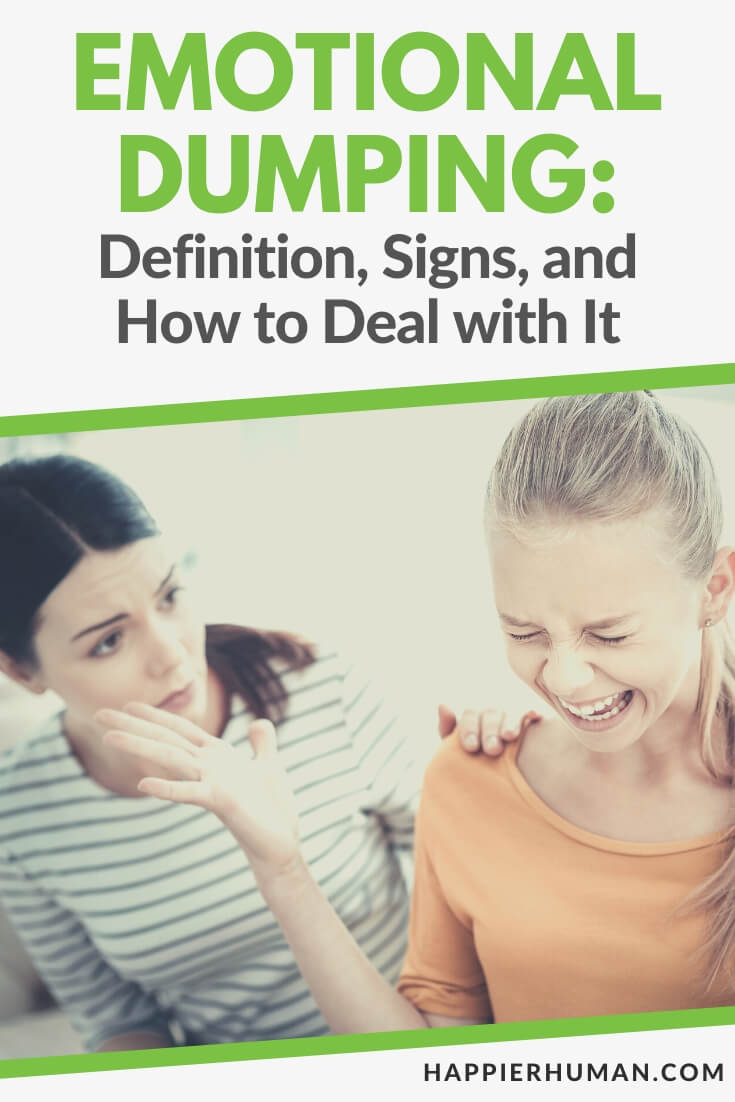Throughout life, we encounter many unpleasant situations that create emotional discomfort.
It’s natural to turn to others for guidance and emotional support when going through tough times.
As humans, we forge bonds not just by sharing pleasant moments but also by supporting each other during difficult times.
And yet, what’s the difference between venting your emotions and dumping them onto another person?
As you are about to discover, emotional dumping is an unhealthy behavior that not only “drains” the relationship but also prevents you from coping with your problems effectively and maturely.
What is Emotional Dumping?
Emotional dumping (or trauma dumping) is the repeated act of unloading your emotional burdens onto another person to gain emotional relief at their expense.
In general, people who excessively vent tend to dump their trauma on family members, friends, and colleagues.
This intense oversharing often leaves others feeling uncomfortable, helpless, and emotionally drained.
Emotional dumping took on a whole new form with the popularization of social media platforms.
I’m sure each of us has stumbled upon triggering posts in which people overshare traumatic stories. Teenagers, especially those who are dealing with depression [1], tend to use social media for emotional relief.
Perhaps you even have that one friend who always calls you to complain about their toxic partner or abusive parents.
You probably noticed that, after a while, their stories begin to feel ‘heavy’, and no matter what you say or do, they don’t seem willing or able to do something about their difficult situation.
Sooner or later, being their ‘emotional dumpster’ takes a toll on your mental health, leading to problems like compassion fatigue.
At first, you might be tempted to think people who resort to emotional dumping are selfish individuals with no regard for other people’s boundaries.
But there’s a story behind this behavior; I want to share a story not to garner more sympathy (you’ve already given plenty of that) but to gain understanding and learn how to set boundaries.
A Quick Overview of Trauma
Trauma is the result of an experience that exceeds your ability to cope. [2] It is accompanied by intense fear, helplessness, and vulnerability, which shake you to the core and alter your perception of the world.
In other words, people who resort to emotional dumping don’t see a way out of the dire situation they’re in.
They feel powerless and overwhelmed by the intense feelings associated with trauma and desperately seek some form of emotional relief.
Some find comfort in addictions like substance use, shopping, or binge eating, while others unload their emotional burdens onto others.
In a way, suffering justifies their need to complain repeatedly about the traumatic experiences they went through.
However, emotional dumping will only prolong the pain as it prevents the sufferer from developing healthy coping strategies for trauma.
Long story short, trauma is a profoundly debilitating experience that requires professional help.
Dumping it on others will only result in toxic relationship dynamics.
Healthy Venting vs. Emotional Dumping
Sharing our troubles and burdens can be beneficial, as social support plays a crucial role in overcoming emotional problems.
However, the painful stories and traumatic experiences that some of us share can exert intense emotional pressure on those who listen. [3]
Does this mean we should ‘bottle up’ our feelings and avoid discussing our problems?
Of course not.
Humans are wired to connect with others and share all sorts of experiences. This informational exchange facilitates strong bonds that help us survive and thrive.
So, where exactly do we draw the line between venting our emotions and dumping them onto other people?
First, healthy venting is like a two-way street. I share my burdens while you offer an empathetic ear, then I make room for your stories, and so on. In other words, we engage in a conversation where we cultivate mutual support.
Emotional dumping is unidirectional in the sense that one person overshares while the other listens.
Second, while healthy venting occurs in appropriate contexts and between people who share a relationship, emotional dumping can occur impulsively, often without any regard for the nature of the relationship.
Third, healthy venting means being mindful of the other person’s boundaries and not monopolizing the conversation. Emotional dumping often involves a total disregard for the listener.
Lastly, someone only looking to share an unpleasant situation is open to feedback and solutions. At the same time, someone who treats you like an ‘emotional dumpster’ will shoot down any advice or solution.
7 Signs of Emotional Dumping
Sometimes, it’s difficult to notice when someone is dumping their trauma onto you. Maybe you empathize strongly with their struggles, or perhaps you’re the kind of person who puts others’ needs above yours.
Here are some of the telltale signs that indicate someone is dumping their trauma onto you.
1. It’s Always About Them
If you suspect that someone might be dumping their trauma on you, the first place to start investigating is the dynamics of your conversations.

In other words, if it feels like a one-way conversation where it’s always about their needs, problems, and drama, then you’re probably the receiver of emotional dumping.
2. It’s Always the Same Topic
Whether you meet for coffee or exchange a few text messages, it’s always the same topic.
No matter how much you try to bring up other subjects, you always end up listening to their problems.
It’s a never-ending cycle where they gain emotional relief by dumping their trauma on you, only to return the next time they feel overwhelmed by something.
3. They Get Angry the Minute You Set a Boundary
Perhaps you’ve noticed this toxic dynamic for a while and decided to do something.
Whether you approach them with a gentle suggestion like “Maybe you should talk to someone who can help you” or directly confront their lack of self-awareness, there’s a good chance you’ll end up triggering them.
In other words, you get a barrage of anger, frustration, and outrage.
4. You Feel Stressed Every Time You See a Text or Call from Them
If you have a friend, colleague, or family member who might be dumping their problems on you, ask yourself the following questions:
- What’s the first thing you feel when you get a text from them?
- What’s the first thought that goes through your head when they walk into the office?
- How do you feel when they invite you to have lunch together?
If you feel stressed and uneasy, then you might be dealing with someone who’s only using you to unload their trauma.
5. Every Interaction Drains You Emotionally
Being someone’s ‘emotional dumpster’ becomes draining at some point because all they do is ask, complain, and ‘unload’ problems while you sit there waiting for a moment when you can finally steer the conversation away from their drama.
Only you never get to share your burdens or talk about what you enjoy.
Sounds familiar? Then you’re probably dealing with an emotionally draining person.
6. They Share a Disturbing Post and Immediately Disappear
Often, people resort to social media platforms to ‘dump’ their traumas and problems.
This is called sad phishing or stress posting, and it’s basically online emotional dumping.
Not only can oversharing posts about self-harm, suicide, or traumatic experiences be triggering for others, but it can also attract bullying and criticism.
7. They Reject Advice or Professional Help
Many times, the people who trauma dump are close friends or maybe relatives, someone we care about deeply.
Because we don’t want to see them do something regrettable, we desperately try to help them overcome their troubles.
But the more we try to help, either with advice or recommendations for professional help, the more resistance we encounter.
Long story short, people who trauma dump don’t seek help; they just want to complain and get some instant emotional relief.
How to Deal with Emotional Dumping:
People who resort to trauma dumping lack emotional maturity in the sense that they neither learned effective ways to cope with difficult emotions nor can understand how their attitude is affecting others.
Being at the receiving end of emotional dumping is tough but not impossible to manage.
There’s no point in blaming them for how they handle their emotional difficulties and neither in sacrificing yourself to rescue them.
Here’s what you can do:
1. Don’t Be Afraid to Set Boundaries
When dealing with toxic personalities, the most crucial step is to set firm boundaries.
Whether it’s not answering your phone after a certain hour or saying no when they ask you to ‘grab a coffee’, your willingness to set boundaries keeps a balanced relationship dynamic.
Setting limits with people you care about deeply can be extra challenging. It can be even more complicated when that person goes through intense emotional distress resulting from a traumatic experience.
Maybe there were times when you wanted to end a ‘heavy’ conversation but felt too guilty to say something.
Perhaps you think that saying ‘no’ to someone facing a difficult situation makes you horrible.

But setting boundaries is neither about ‘slapping’ the other person with a cold and sharp ‘no,’ nor is it about bluntly refusing to help them.
Setting healthy boundaries is about finding that ‘sweet spot’ between self-respect and compassion towards the other person’s suffering.
There’s a big difference between “Please stop complaining to me about…” and “I get that you’re going through a rough patch, and I wanna be here for you. However, there are times when I’m too tired, or maybe I need you to understand and support me.”
Simply put, a healthy boundary is a limit you draw not to keep the other person away but to create a comfortable and fulfilling dynamic for both of you.
2. Tell Them How You Feel
Sometimes, people who trauma dump are unaware of how others feel.
They’re so caught up in their emotional distress that they don’t realize how their constant complaining can exert a lot of stress on others.
At the risk of repeating myself, remember that their apparent lack of consideration for other people’s emotional availability is not something they do intentionally.
It is often the result of poor emotional coping skills.
Although I’m a firm believer in compassion and understanding, there are times when honesty and assertiveness might do a lot of good for both of you.
In other words, a kind discussion about how you feel as the recipient of their trauma might serve as an eye-opener.
Just keep in mind you’re talking to a vulnerable person who could easily interpret your sincerity as an offense or personal attack.
That’s why my advice is to refrain from phrases like “You’re making me feel…” or “I think you should…” and focus on expressing your concern for their well-being and all the difficult emotions you experience.
Although this approach doesn’t guarantee that they will understand the severity of the situation or seek professional help, it could create space for some personal boundaries.
3. Don’t Try to Fix Their Issues
If you’re a problem solver like me, the first thing that pops into your head when someone pours their heart out to you or repeatedly complains about a difficult situation is: “How can they fix this?”
It’s easy to forget that people who resort to emotional dumping are rarely interested in a solution. They just want someone who will listen while they vent painful feelings.
No matter how much you try to help or how many solutions you offer, change will only occur when they feel ready to take a step toward recovery.
The sooner you realize this, the fewer emotional resources you’ll spend trying to fix a problem that is out of your control.
4. It’s ok to Say “I Don’t Know How to Help You”
No matter how resilient you are or how much emotional support you can offer, there will come a time when you grow tired of all the drama and stress they ‘dump’ on you.
Unfortunately, some of us are so eager to help others that we ignore that inner sense of helplessness and bend over backwards, hoping that something will change.
We are so touched by their tragic story that we want to do everything we can to ease their suffering.
What we fail to realize is that we’re slowly becoming enablers.
By being available 24/7 and acting as a passive listener in their tragic story, the only thing you’ll achieve is providing them with a temporary ‘quick fix’ for emotional distress.
It’s like trying to save someone from drowning, only to end up sinking with them.
To avoid reaching your breaking point, I suggest you not only listen but also express that inner sense of helplessness you experience whenever they dump their trauma on you.
5. Put Some Distance Between You and Them
Everything I recommended so far involves both a change in attitude and perspective on your part and some openness on theirs.
But what if nothing works?
What if they ignore your needs and feelings, consistently cross your boundaries, and vehemently refuse advice or help?
It is undoubtedly a difficult situation that puts you in front of a difficult choice – continue to provide a space where they can dump their trauma or put some distance between you and them.
Given that people who trauma dump have zero boundaries, they will continue to reach out no matter how many limits you try to set.
That’s why sometimes the only option left is to pull back.
I Think I Might Be THAT Person. What Should I Do?
First, there’s no reason to feel bad about yourself. The fact that you realized this means you’re one step closer to accepting that what you’re going through is a serious problem that requires professional help.
Second, you don’t have to repress your emotions and pretend the problem doesn’t exist whenever you talk to your friends or family members.
Just be mindful of their needs, be genuinely open to their stories, and create a space where they feel more like people you care about and less like an emotional crutch.
Consult a Mental Health Professional
Given that life is unfair and unpredictable, each of us is at risk of developing mental health problems, regardless of age, sex, income, or ethnicity.
From biological factors and socio-economic contexts to lifestyle choices and traumatic experiences, numerous elements may give rise to depression, anxiety, and chronic stress.

In the absence of effective coping skills, the only thing left is to seek emotional relief by complaining or dumping your problems on others.
Remember that seeking the help of a professional (psychologist or psychiatrist) is a sign of maturity, courage, and strength.
With the help of a professional, you can get to the root of the problem, explore ways to develop emotional maturity, and cultivate a fulfilling life.
Join a Support Group
Support groups allow you to interact with people who’ve been through similar difficulties.
Whether it’s in-person or online, a support group provides you with a safe space where you can express feelings and share your story.
In essence, these groups focus on ways to cope with difficult situations that cannot be changed, such as going through a breakup or losing a loved one.
Not only can a community foster a sense of belonging, but it’s also a good place to gain valuable insights on overcoming your difficulties.
Long story short, a support group is a less structured and less formal context where people who attend share ways to cope that worked for them and might help you too.
Final Thoughts on Emotional Dumping
Emotional dumping (or trauma dumping) involves long venting sessions where a person overshares disturbing events and repeatedly complains about a painful experience they went through, in hopes of gaining emotional relief.
Whether it occurs in person or online, this toxic form of communication can generate strong feelings of stress, overwhelm, and uneasiness for others.
If you find yourself at the receiving end of a trauma dumping:
- Set clear and firm boundaries.
- Don’t try to fix their problem (because they probably won’t accept help)
- Communicate (openly and kindly) how this toxic dynamic makes you feel.
- Try to offer some advice, but know when to say, “I don’t know how to help you.”
- If all the above fails, put some distance between you and them.
Remember that people who resort to emotional dumping are neither ill-intentioned nor deliberately manipulative.
They just lack the knowledge and skills to cope with their emotions maturely and healthily.
And if you're looking for more articles about emotions, be sure to check out these blog posts:
- 71 Negative Emotions: A List of Negative Feelings Examples
- Emotional Dumping VS Healthy Venting: 7 Basic Differences
- Emotions VS Feelings: 7 Important Differences

References
| [1] | A. Radovic, T. Gmelin, B. D. Stein and E. Miller, “Depressed adolescents' positive and negative use of social media,” Journal of Adolescence, pp. 5-15, 2016. |
| [2] | A. P. Association, Diagnostic and statistical manual of mental disorders (5th ed.), 2013. |
| [3] | J. K. Kallas, H. K. Horstman, E. K. Willer and K. Carr, “The benefits and risks of telling and listening to stories of difficulty over time: experimentally testing the expressive writing paradigm in the context of interpersonal communication between friends,” Health Commun., vol. 30, no. 9, pp. 843-858, 2015. |

